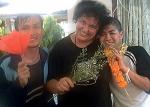Writing From The Ground
New York Times columnist, Nicholas Kristof (incidentally from my home state of Oregon) has written an excellent review of William T. Vollman’s book entitled “Poor People” that reflects a deep understanding of the issues underlying poverty.
From my 30 years of work with impoverished people in the US and from six years of travel in impoverished countries, what Kristof says rings true for me.
Vollman interviewed poor people in several countries and asked them questions like “do you consider yourself poor?” Or “why are poor people poor?” Or “are men and women equally poor?” Or “why are you poor?” Or “why are some people rich and some poor?”
Kristof considered Vollman’s book a kind of “tour guide of the slums.” The answers were not very illuminating without some larger context…just as I pointed out in my last blog entry on getting information and making connections between the pieces.
Referring to just one issue, health care, Kristof says that before seeing the effects of the hurricane on New Orleans, he “had thought that the obstacle for poor people—and the reason they die as a result of deficient health care —was that they couldn’t afford it. But that’s only one factor.
What we’ve seen over and over is that even if there is a free clinic, the poor family may depend on a single mother who doesn’t have a car or driver’s license and so can’t get there. Or she can’t afford the gas. Or her car doesn’t have insurance. Or she doesn’t understand how serious the symptoms are. Or she is working at a low-level job where she can’t just ask for time off to take a child to the clinic. Or she doesn’t speak English. Or she’s illegal and is worried that INS agents may look at the clinic’s records. Or she’s got three other small children and can’t leave two at home while she takes her sick child on a series of bus rides to the clinic. Or…the possibilities are endless. The point is that making medical care accessible to the poor requires much more than making it free.”
Economic-development experts promise that with the correct mix of promarket policies, poor countries will eventually prosper. But policy may not be the only problem. Geography may be a problem. Tropical, landlocked nations may never enjoy access to the markets and new technologies they need to flourish in the global economy. In Oaxaca, only government workers (who usually live in Oaxaca City) get free health care. For the poorest of the poor there are no accessible clinics at all without a 7 hour bus ride out of the mountains…even if they had the money. As a result the infant death rate in Oaxaca is twice what it is in Mexico City.
Tags: Oaxaca, Reading, Reflections


Leave a Reply